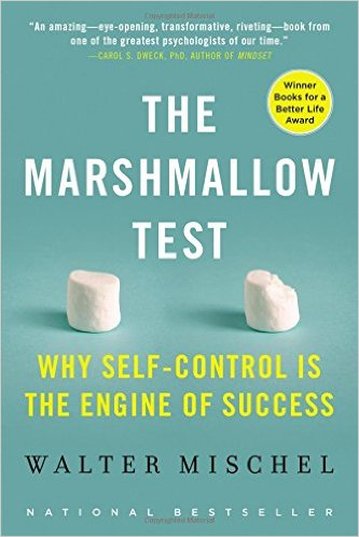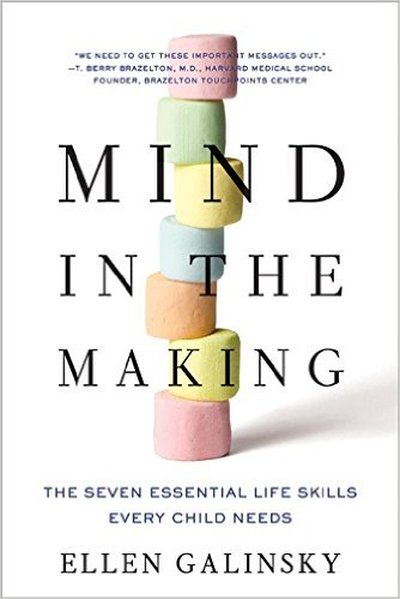There is No Benefit to Having Self-Esteem. Here's What Children Should Be Learning, Instead.3/9/2016
Brace yourself -- I'm about to show you one of the cutest, most hilarious videos of all time. Ready?
Cool fact: that video is actually a replication of one of the most important psychology studies ever. Walter Mischel's Marshmallow Test measured the responses of three- and four-year-old students who were told they could either have one marshmallow now... or two marshmallows, if they could wait for five minutes. Then they were left alone with the marshmallow.
The immediate results were interesting -- kids who waited were more successful in school, popular with peers and highly-rated by teachers. But that's not what made the study revolutionary -- what made it revolutionary was that Mischel then followed the kids for the next thirty years.
The results? Kids who passed the test were richer as adults. More educated. More likely to be married. More likely to be happy. They scored higher on the SATs. They led healthier lifestyles and had a greater sense of self-worth.
Meanwhile, kids who failed were less likely to have good relationships or be employed. They were, however, more likely to have gone to jail. Mischel elaborates on some of this research -- and how both children and adults can master self regulation -- in his highly acclaimed book, The Marshmallow Test: Why Self Control is the Engine of Success:
You'd think that, with results this profound, self control is something that would be taught in schools. And, to some degree, it is -- there are rules in school, and students are expected to follow them. But it's not something that most teachers explicitly emphasize in their classroom.
You know what they "teach" instead? Self-esteem. Instead of letting children develop self-esteem on their own, through hard work, SMART goal setting, improvement and achievement... teachers force it upon their students as an exercise in and of itself. Take, for example, Self Science: The Emotional Intelligence Curriculum, a two-year, 54 lesson program for teaching self-esteem (and, to be fair, other emotional skills) to elementary school students. This contains exercises such as the self-esteem roll call game: when the teacher calls out your name during attendance, you don't answer by saying, "Here," but by saying either:
The exercises are designed to be either standalone lessons, or integrated with the students' academic classes. A quick Google search will turn up hundreds of similar programs, lesson plans, videos, books, curricula and exercises that are meant to "build" students' self-esteem. If that weren't bad enough, schools have taken several well-intentioned (but ultimately harmful) measures to "protect" students' self-esteem. For example, many schools have become anti-competition zones -- games with winners and losers are no longer acceptable, in spite of the fact that decades of psychology research show that competition is an important and healthy part of every child's development. When competition is inevitable, such as during athletic contests, all students "win" a participation award. Schools -- even high schools -- are getting rid of honor rolls, because it's not "fair" to those who don't make it. (And, yes, I understand that getting an A isn't the same as learning. But it is still important for students to have goals and rewards for their hard work. See also: Straight As Make You Look Complacent, Not Curious.)
I'm not gonna lie: being Athlete of the Year felt good. Even though it meant dozens of extremely talented athletes were disappointed. But guess what? Because they'd developed resilience through victories and losses throughout their lives, they dealt with it.
But is all this effort really worth it?
According to Roy F. Baumeister et al.'s 2003 meta-analysis, Does High Self-Esteem Cause Better Performance, Interpersonal Success, Happiness or Healthier Lifestyles, No. There is no relationship between high self-worth and achievement. In fact, high self-regard is commonly found in narcissists, bullies and sociopaths. People with high, unwarranted self-esteem often have an inflated sense of popularity and likability. They get hostile when criticized or rejected. They alienate others. So is self-esteem good for anything? The best answer is... Maybe. There is a correlational relationship between happiness and self-esteem, but, remember: correlation is not causation. We don't know if happy people have higher self-esteem, or if self-esteem makes people happier. We also don't know if this relationship is even true -- after all, happiness and self-worth are measured by self-report. I love psychology, and I spent a lot of time studying it. I often cite studies that use self-report, but it's still a limiting method. People can, and often, say one thing, when they mean the other. In this case, studies suggest that people with high self-regard exaggerate their positive qualities. Meaning there isn't necessarily any benefit at all to high self-esteem. But you know what there is a benefit to? Mindfulness. As I wrote in How One Rapper Brought a Whole 5th Grade Classroom to Tears: "Mindfulness, particularly early in life when neuroplasticity is at its peak, has the potential of helping children pursue a trajectory of healthy development," wrote Richard Davidson, founder of CIHM and a professor of psychology and psychiatry.
Here's how mindfulness training looks in practice:
And, more importantly, parents and teachers should explicitly teach children to self-regulate. This is almost the opposite of teaching self-esteem -- but, as demonstrated by both Walter Mischel and the research-based Tools of the Mind program, it's one of the most important lessons you can teach a child.
Tools of the Mind teaches focus and self-control; perspective taking; communication; making connections; critical thinking; embracing challenges; and learning through play (which is the most important possible kind of learning -- after all, Einstein didn't use flashcards). These seven skills are, according to Mind in the Making author Ellen Galinsky, the essential life skills every child needs. Moreover, as Mischel's research demonstrated, they are the skills that are most likely to make your child happy -- for the rest of their life. And, on a broader scale, the self-regulation/mindfulness approach is much more likely to help close the achievement gap... than "giving" kids self-esteem that kids of previous generation earned.
11 Comments
Fenn
3/19/2017 02:26:23 pm
I really don't think your argument makes sense. You're not arguing that self-control opposes self-esteem or even diminishes it, simply that it's better than constantly rewarding kids. Totally right. But also, this idea of "happiness" is flawed. Happy is a mood, not a state of being. Self-esteem has a LOT of positive (and recorded) benefits. "Happiness" does not. Also, it's true that self-esteem comes from self-control and winning and losing and all the things you stated that are good for kids vs. attempting to force positive outcomes and positive moods in a false environment. I just don't think you've really made the point here.
Reply
4/14/2017 11:29:17 am
First of all, I'm pretty sure that's not my argument. The argument, as per the title of this post, is "There is no benefit to having self-esteem." Schools should be teaching something that IS beneficial and valuable, instead. For example, self-regulation. I made no claim about a relationship between self-control and self-esteem, so I'm not sure where you got that.
Reply
Brian Wasserman
6/24/2017 02:51:04 pm
By saying that schools should be teaching one thing instead of another, you are implying that one is better than the other, which is a relationship between them. Otherwise, why not teach both, or neither. Also, if you're argument is that there is not benefit to self esteem, why do you write, "Is self esteem good for anything.. maybe." It seems like that contradicts your title. You also ask why kids must be taught self-esteem instead of learning it through achievement and other ways, but later in the article say that there is no correlation between high self worth and achievement. If point of the article is supposed to be to show that there is not benefit to having self esteem, I don't think you show that at all. You show benefits or problems with other ideas, but do not connect them to self esteem. 6/24/2017 03:26:01 pm
"why not teach both, or neither."
Maud
6/9/2017 08:17:28 am
Maybe there's no benefit to have a high self esteem but having a low self esteem is pretty dementrial as well.
Reply
Brian Wasserman
6/24/2017 01:36:02 pm
When you say there is no correlation between achievement and self-esteem, to me that sounds like an argument for self esteem. I am listening to a book on CD right now in which many young women are interviewed, and they are their peers are doing a lot of things to get the attention of boys because that is what they base their self worth on. So even though they may be high acheivers in terms of grades or sports, they still have low self-esteem. So I agree that there is no correlation between achievement and self esteem, but that is exactly what makes it so important. The dictionary defines self esteem as having proper respect for yourself as a human being, and if you do not have that than you let others tell you how to feel about yourself. That leads you to do many things that you would not do otherwise, such as ( to use examples from the book I am refering to) sending naked pictures of yourself, or dressing in a way much too sexy for your age, or calling other girls names so that you can feel superior. I don't really understand arguing against self esteem, unless you are defining it in a different way, because I have always thought it had to do with believing in your own worth, even if you were not as successful at everything you do as you would like to be, and even if other people don't value you. I don't understand how that could not be a help to you in life.
Reply
6/24/2017 03:01:59 pm
"I am listening to a book on CD right now in which many young women are interviewed, and they are their peers are doing a lot of things to get the attention of boys because that is what they base their self worth on."
Reply
6/24/2017 03:10:28 pm
If attachment is the issue, I think it's possible a research-based intervention could help, since so many psychologists have studied attachment styles. 6/24/2017 03:13:35 pm
Or, it could just be because we live in a "raunch culture," in which everything is explicit and overt and expected. There is no delay of gratification. There is no modesty. There is no longing.
David
7/1/2018 04:33:37 am
Interesting read. I was with you until you started down the path of suggesting self-esteem and self-regard are the same thing. They are quite different. I believe a large cause of bully behavior is having high self-regard, but low self-esteem. True self-esteem does not require putting others down to lift yourself up whereas self-regard is all about being on top no matter what it takes.
Reply
notimportant
6/29/2020 01:59:26 pm
I couldn't agree more with this piece.
Reply
Leave a Reply. |
About the Author

Eva is a content specialist with a passion for play, travel... and a little bit of girl power. Read more >
Want to support The Happy Talent? CLICK HERE!
Or Find me on Patreon!
What's Popular on The Happy Talent:
Trending in Dating and Relationships:
What's Popular in Science: Playfulness and Leisure Skills:
Popular in Psychology and Social Skills:
Categories
All
|




























 RSS Feed
RSS Feed